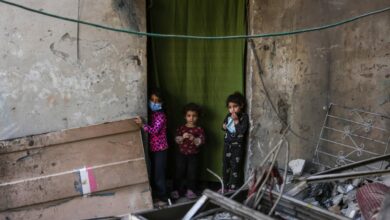UN highlights ‘chaotic’ Gaza displacement under Israeli evacuation

UN humanitarians describe as “dangerously chaotic” confusing Israeli evacuation orders to Gazans, which is causing the displacement of tens of thousands of people, a UN spokesman said on Tuesday.
“Our colleagues from the Office for the Coordination of Humanitarian Affairs (OCHA) describe the displacement of thousands of people in Gaza City as dangerously chaotic,” said Stephane Dujarric, chief spokesman for UN Secretary-General Antonio Guterres. “This follows recent Israeli evacuation orders instructing people to leave into or through neighborhoods where (active) fighting is taking place — or areas where separate evacuation orders were later issued.”
Dujarric said Gazans fled in multiple directions, not knowing which way may be the safest. Under fire and bombardment, many people were displaced, with very few of them able to take their possessions.
“Civilians in Gaza must be protected and have their basic needs met, whether they move or stay,” he said. “Those who leave must have enough time to do so, as well as a safe route and a safe place to go.”
OCHA warned that active hostilities in the areas are preventing aid organizations from accessing warehouses. They have also been unable to restock, resupply or assess people’s needs.
The humanitarians said the largest bakery supported by the United Nations in Gaza was among those forced to shut down following the latest evacuation orders, and significant amounts of flour, sugar and yeast are now expected to be lost.
Bread is an integral part of life for Gazans since it is relatively inexpensive and filling, staving off famine.
“Humanitarian colleagues managed to provide fuel to multiple bakeries to run backup generators in the absence of electricity across the Gaza Strip,” the spokesman said. “As a result, the number of operational bakeries increased to 10, including seven in Deir al Balah and three in northern Gaza. This is out of 18 bakeries that are supported by the UN in Gaza. However, this fuel is only enough to keep these bakeries operating for another day or two.”
He said humanitarian colleagues could bring just over 500,000 liters of fuel into Gaza during the first week of July and over 2 million liters were brought for June. In both cases, it was less than one-fifth of the estimated 400,000 liters required daily to sustain humanitarian, medical and related operations.
“Efforts to bring fuel and critical humanitarian assistance into Gaza continue to be impeded by active hostilities, damaged roads, access limitations, and the lack of public order and safety,” Dujarric said. “These factors hamper movements along the main humanitarian cargo route from the Kerem Shalom crossing to Khan Younis and Deir al Balah.”
He added during his regular briefing that the UN coordinator for humanitarian affairs in Palestine, Muhannad Hadi, visited Deir al Balah in Gaza, meeting with United Nations and non-governmental colleagues, including representatives of women-led organizations, who spoke about the dire conditions for women in the Gaza Strip.
Source link



